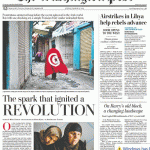The UN Security Council has passed a resolution authorising “all necessary measures” to protect civilians in Libya from pro-Gaddafi forces. Read the full text of the resolution passed at UN headquarters in favor of a no-fly zone and air strikes against Muammar Gaddafi.
Department of Public Information • News and Media Division • New York
Security Council
6498th Meeting (Night)
Security Council Approves ‘No-Fly Zone’ over Libya, Authorizing ‘All Necessary Measures’ to Protect Civilians, by Vote of 10 in Favour with 5 Abstentions
*****************
ARABIC text of UN security council resolution 1973 (2011)
مجلس الأمن
قرار مجلس الامن
القرار ١٩٧٣
الذي اتخذه مجلس الأمن في جلسته ٦٤٩٨ ، المعقودة في ١٧ آذار/مارس ٢٠١١
إن مجلس الأمن،
إذ يشير إلى قراره ١٩٧٠
المؤرخ ٢٦ شباط/فبراير ٢٠١١
وإذ يعرب عن استيائه لعدم امتثال السلطات الليبية للقرار ١٩٧٠
وإذ يعرب عن القلق ا لبالغ إزاء تدهور الوضع وتصاعد العنف والخسائر
الفادحة في صفوف المدنيين، …………… الخ
******************************************************
Libya UN Resolution 1973:
Text analysed (BBC)
*************************************************
[Gaddafi’s flag]
In Swift, Decisive Action, Security Council Imposes Tough Measures on Libyan Regime, Adopting Resolution 1970 in Wake of Crackdown on Protesters Situation Referred to International Criminal Court;Secretary-General Expresses Hope Message ‘Heard and Heeded’ in Libya
***********
دستـور لـيبيـا
أصدرته “الجمعية الوطنية الليبية” في 7 أكتوبر 1951
وألغاه الإنقلابيون في أول سبتمبر 1969
=
Libyan Constitution
*************************************************
Libya’s Constitution
Promulgated by the “National Constituent Assembly” on
7th October 1951
Abolished by a Military Coup d’etat on
1st September 1969








